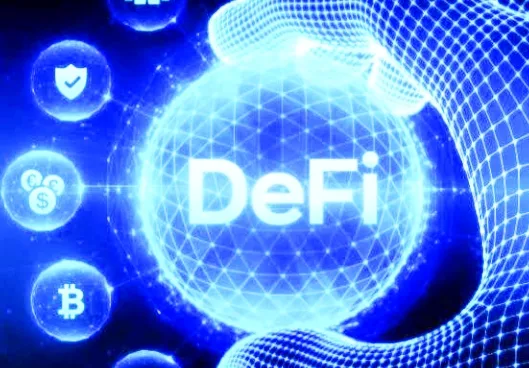Security Perspective of Decentralized Finance (DeFi)
Decentralized finance (DeFi) has emerged as a revolutionary concept, offering financial services without the need for traditional intermediaries like banks. However, this innovation comes with its own set of security challenges. Let's delve into the security landscape of DeFi and explore the potential risks and mitigation strategies.
Table: Security Risks and Mitigation Strategies in DeFi
| Security Risk | Description | Mitigation Strategies |
|---|---|---|
| Smart Contract Vulnerabilities | Bugs or exploits in code underlying DeFi applications can lead to hacks and theft of funds. | Rigorous code audits, security testing, and formal verification before deployment. |
| Flash Loans | DeFi protocols allow users to borrow large, uncollateralized loans for a short period. Malicious actors can exploit this to manipulate asset prices and drain liquidity. | Implementing stricter borrowing and repayment terms, monitoring for suspicious activity. |
| Oracle Attacks | DeFi relies on oracles to provide external data feeds to smart contracts. Tampering with this data can lead to inaccurate information and manipulation. | Using decentralized oracles with diverse data sources, implementing access controls. |
| Rug Pulls | Developers abandon a project after raising funds through DeFi protocols, leaving investors with worthless tokens. | Investing in projects with established teams, reputable auditors, and clear roadmaps. |
| Social Engineering Attacks | Phishing scams and impersonation of legitimate DeFi platforms can trick users into revealing private keys or sending funds to malicious addresses. | Practicing good cyber hygiene, remaining vigilant of suspicious messages, and double-checking website URLs. |
Understanding the Threats
-
Smart Contract Vulnerabilities: DeFi applications are powered by smart contracts, self-executing code that automates financial transactions. Since these contracts are immutable on the blockchain, any vulnerabilities can be exploited and irreversible.
-
Flash Loans: DeFi allows for borrowing large sums of cryptocurrency without collateral for a limited time frame. Malicious actors can leverage this to manipulate markets and steal funds through complex arbitrage strategies.
-
Oracle Attacks: DeFi utilizes oracles to bring external data into the blockchain network. If these oracles are compromised, hackers can manipulate the data feed and trigger unintended actions within DeFi protocols.
-
Rug Pulls: DeFi projects can be entirely fraudulent, with developers disappearing after raising funds through token sales. Investors are left holding worthless tokens with no recourse.
-
Social Engineering Attacks: DeFi users are susceptible to traditional social engineering scams, such as phishing emails or impersonation of DeFi platforms. These attacks aim to trick users into revealing private keys or sending funds to fraudulent addresses.
Mitigating the Risks
-
Smart Contract Security: тщательная проверка кода ( тщательная проверка кода is Russian for "rigorous code audit") is essential before deploying smart contracts. Security experts should meticulously examine the code for vulnerabilities and potential exploits. Formal verification techniques can also be employed to mathematically prove the correctness of the code.
-
Flash Loan Controls: DeFi protocols can implement stricter borrowing terms and limitations on flash loan sizes. Additionally, monitoring for suspicious activity and identifying potential arbitrage manipulation attempts can help mitigate risks.
-
Decentralized Oracles: Relying on decentralized oracles with diverse data sources can strengthen the integrity of data feeds. Furthermore, access controls and permissioning systems can restrict unauthorized manipulation of oracle data.
-
Investor Due Diligence: Before investing in any DeFi project, it's crucial to conduct thorough research on the team's background, the project's roadmap, and the involvement of reputable security auditors.
-
Cybersecurity Awareness: Practicing good cyber hygiene is paramount for DeFi users. Staying vigilant of suspicious emails or messages, employing strong passwords and multi-factor authentication, and double-checking website URLs before interacting with DeFi platforms are all essential security measures.
By understanding the security landscape and implementing these mitigation strategies, DeFi can evolve into a more secure and trustworthy financial ecosystem. However, it's important to remember that DeFi is a rapidly evolving space, and new threats may emerge. Continuous vigilance and innovation are necessary to ensure the security of DeFi and protect users' funds.
The Future of DeFi Security
The security of DeFi is a constant work in progress. Here's a glimpse into what the future might hold:
-
Formal Verification: Formal verification, a mathematical approach to proving the absence of bugs in code, is gaining traction. Widespread adoption of formal verification tools could significantly enhance the security of smart contracts.
-
Self-Custody Solutions: As DeFi matures, user-friendly self-custody solutions will become increasingly important. These solutions empower users to manage their own private keys and crypto assets, reducing reliance on centralized custodians.
-
Bug Bounty Programs: Bug bounty programs incentivize security researchers to identify and report vulnerabilities in DeFi protocols. This collaborative approach can help uncover and address security issues before they are exploited by malicious actors.
-
Decentralized Insurance (DeFi Insurance): Emerging DeFi insurance products offer protection against hacks, smart contract exploits, and other DeFi-specific risks. These products can provide users with peace of mind and encourage wider adoption of DeFi.
-
Regulatory Landscape: Regulation can play a role in promoting security within the DeFi space. However, striking a balance between fostering innovation and protecting users is crucial. Regulations should aim to address specific security risks without stifling the growth of DeFi.
Conclusion
Decentralized finance offers a paradigm shift in financial services, but security remains a paramount concern. By acknowledging the existing risks, employing robust mitigation strategies, and embracing advancements in security technology, the DeFi ecosystem can evolve into a more secure and trusted environment. As DeFi continues to mature, fostering collaboration between developers, security experts, regulators, and users will be instrumental in creating a secure and sustainable future for this innovative financial landscape.
Frequent Asked Questions (FAQs) on the Security Perspective of Decentralized Finance (DeFi)
1. What are the primary security risks associated with DeFi protocols?
- Smart Contract Vulnerabilities: Bugs or flaws in the underlying smart contract code can lead to exploits, such as reentrancy attacks, overflow/underflow errors, and race conditions.
- Oracle Manipulation: DeFi protocols often rely on external data feeds (oracles). If these oracles are compromised or manipulated, it can lead to inaccurate price information and financial losses.
- Phishing and Social Engineering: Scammers often target DeFi users with phishing attacks and social engineering tactics to steal funds or private keys.
- Key Management and Loss: Users are responsible for safeguarding their private keys. Loss or theft of these keys can result in significant financial losses.
- Centralized Points of Failure: While DeFi aims to be decentralized, certain components, such as centralized exchanges or custody solutions, can still introduce points of failure.
2. How can users mitigate security risks in DeFi?
- Research and Due Diligence: Thoroughly research DeFi protocols before investing, focusing on the reputation of the team, the security audit history, and the overall design of the protocol.
- Use Secure Wallets: Opt for hardware wallets or reputable software wallets with strong security features to protect private keys.
- Be Wary of Phishing Attacks: Be cautious of unsolicited messages or links, and verify the authenticity of websites before entering sensitive information.
- Diversify Investments: Don't put all your eggs in one basket. Spread your investments across multiple DeFi protocols to reduce risk.
- Stay Informed: Keep up-to-date with the latest security news and best practices in the DeFi space.
3. What role do security audits play in DeFi?
Security audits are crucial for identifying potential vulnerabilities in DeFi protocols. Independent auditors can assess the code quality, identify potential risks, and provide recommendations for improvement.
4. How can DeFi protocols enhance their security?
- Rigorous Testing: Conduct comprehensive testing and audits of smart contracts to identify and address vulnerabilities.
- Formal Verification: Utilize formal verification techniques to mathematically prove the correctness of smart contract code.
- Diverse Oracles: Rely on multiple, independent oracles to reduce the risk of manipulation.
- Security Incentives: Implement mechanisms to incentivize users to report vulnerabilities and contribute to the security of the protocol.
- Regular Updates and Patches: Stay on top of security updates and patches to address known vulnerabilities.
5. What are the future trends in DeFi security?
- Zero-Knowledge Proofs: These cryptographic techniques can enable privacy-preserving transactions and reduce the risk of data breaches.
- Formal Verification Tools: Advancements in formal verification tools will make it easier to prove the correctness of smart contract code.
- Insurance Markets: DeFi insurance markets can provide financial protection against hacks and other security incidents.
- Regulatory Frameworks: The development of clear regulatory frameworks can help ensure that DeFi protocols adhere to security standards.
By understanding these key security considerations, users can make informed decisions and mitigate risks when participating in the DeFi ecosystem.
29 Terms Related to the Security Perspective of Decentralized Finance (DeFi)
| Term | Definition |
|---|---|
| Smart Contract | Self-executing contracts with terms directly written into code. |
| Vulnerability | A weakness in a system that can be exploited by an attacker. |
| Exploit | A technique used to take advantage of a vulnerability. |
| Reentrancy Attack | A type of exploit where a contract calls itself before completing a transaction. |
| Overflow/Underflow | Errors that occur when arithmetic operations result in values outside the expected range. |
| Race Condition | When the outcome of a system depends on the timing of events. |
| Oracle | A source of external data used by smart contracts. |
| Oracle Manipulation | The act of intentionally providing false or misleading data to an oracle. |
| Phishing | A type of social engineering attack where attackers attempt to trick users into revealing sensitive information. |
| Social Engineering | The manipulation of people to perform actions or divulge confidential information. |
| Private Key | A secret code used to access and control a cryptocurrency wallet. |
| Key Management | The process of storing, protecting, and using private keys. |
| Key Loss | The accidental or intentional loss of a private key. |
| Centralized Points of Failure | Components of a DeFi system that are not fully decentralized, such as centralized exchanges or custody solutions. |
| Rug Pull | A fraudulent scheme where developers abandon a project after raising funds. |
| Exit Scam | A type of rug pull where developers suddenly cease operations and disappear. |
| Ponzi Scheme | A fraudulent investment scheme where returns to earlier investors are paid primarily by funds from more recent investors. |
| Security Audit | A review of a system or process to identify potential vulnerabilities. |
| Formal Verification | A mathematical method for proving the correctness of a system. |
| Diversification | Spreading investments across multiple DeFi protocols to reduce risk. |
| Cold Storage | A method of storing private keys offline to protect them from hacking. |
| Multi-Signature Wallets | Wallets that require multiple private keys to authorize transactions. |
| Insurance | Financial protection against losses due to hacking or other security incidents. |
| Regulatory Frameworks | Rules and guidelines that govern the operation of DeFi protocols. |
| Community Governance | A system where decisions about a DeFi protocol are made by the community. |
| Bug Bounty Programs | Rewards offered to individuals who discover and report vulnerabilities. |
| Security Tokens | Tokens that represent ownership of a security or asset. |
| Privacy-Preserving Technologies | Technologies that protect user data and privacy. |
| Zero-Knowledge Proofs | Cryptographic techniques that allow one party to prove to another party that they know a value without revealing the value itself. |




